Personal tools
News from ICTP 90 - Dateline

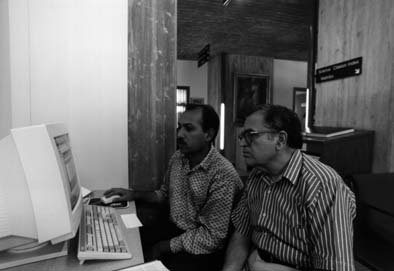
Riazuddin (on the right in the photo), a distinguished theoretical physicist whose affiliation with ICTP dates back to the Centre's earliest days, has been named Director of the newly created National Centre for Physics (NCP) in Pakistan. The Centre, which is part of Quaid-i-Azam University in Islamabad, held its first research activity earlier this year.
"NCP represents the fulfilment of a dream of Abdus Salam's," Riazuddin noted during a recent visit to the ICTP. "When Salam helped launch the International Nathiagali Summer College on Physics and Contemporary Needs in Pakistan in 1976, he hoped that it would eventually evolve into an international physics centre. If he were alive today, I am sure he would be delighted to see that his vision has been transformed into reality."
Like ICTP, NCP will host workshops, colleges, schools, conferences and symposia on subjects related to physics and mathematics. In addition, the Centre will pursue a small number of activities in experimental physics through a co-operative agreement with CERN in Geneva, Switzerland. CERN's Large Hadron Collider (LHC) will serve as the focal point of NCP's experimental work.
"Thanks largely to Salam's efforts, Pakistan enjoys a strong tradition in physics. In fact, there are about 20 university physics departments located throughout the country," explains Riazuddin. "But researchers in these departments often find themselves isolated both from their colleagues and major developments in their fields."
NCP hopes to break this isolation by offering Pakistani physicists the opportunity to work with the world-class scientists who will be invited to lecture and participate in the Centre's research activities. Riazuddin is also convinced that the face-to-face interaction taking place among Pakistani researchers at NCP will help energise the physics community in his home country.
"Each year," he notes, "NCP will focus on three of its six major areas of interest, which include condensed matter physics, particle physics and cosmology, laser physics, plasma physics, mathematical modelling and computational physics."
NCP's first activity, "Frontiers of Physics," which took place in January, was a one-day symposium that attracted more than 30 Pakistani high-energy physicists who were joined by several colleagues from CERN, the DESY synchrotron laboratory in Hamburg, Germany, and the University of Moscow, Russia. This fall, the Centre held a workshop on computational physics, a symposium on relativity and astrophysics, and a workshop on particle physics. Researchers from CERN, DESY and nuclear research facilities in Italy agreed to participate in the latter activity.
"With financial support from the Pakistani government and co-operative agreements with physics research centres and universities across the globe," Riazuddin adds, "I am hopeful that NCP will quickly become a thriving research centre. The success of our efforts would provide another fitting tribute to the legacy of Abdus Salam."
The work of two Nobel Laureates, who participated in ICTP's First Stig Lundqvist Research Conference on the Advancing Frontiers in Condensed Matter Physics, held at ICTP on 26-29 July, represent some of the best examples of physics' ability to reshape today's technology.
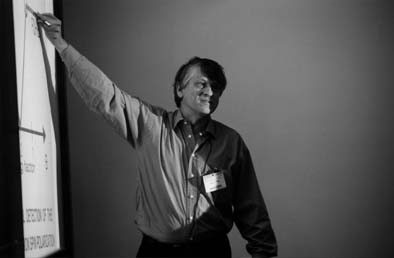
Klaus von Klitzing, acting director at the Max Planck Institute for Solid State Research in Stuttgart, Germany, received the Nobel Prize in 1985 for his discovery of the behaviour of electrons under strong magnetic fields. His finding, which solved the quantised Hall effect, allows more precise measurement of electrical resistance and more accurate testing of theories about electronic movements in solids.
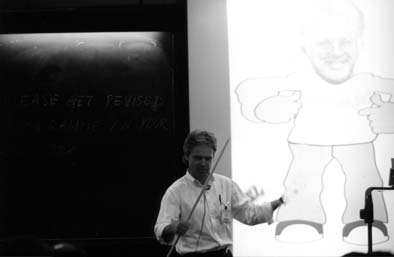
Horst L. Störmer, who holds a joint appointment with Columbia University in New York City and Lucent Technologies in New Jersey (USA), won the Nobel Prize in 1998 for his discovery of the so-called fractional quantum Hall effect-a phenomenon in which electrons subject to extremely powerful magnetic fields and low temperatures form new particles carrying charges that are fractions of electron charges. These particles, which condense into a kind of quantum fluid, have provided profound insights into the inner structure of matter. That knowledge, in turn, has proven instrumental in increasing our understanding of the behaviour of superconducting materials. The conference was named in honour of Stig Lundqvist, the noted Swedish physicist who headed the Centre's Scientific Council from 1983 to 1992.
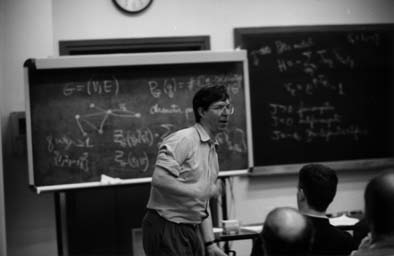
In 1996, Alan D. Sokal, professor of physics at New York University (USA), published an essay in Social Text, a cultural studies journal, suggesting a link between quantum mechanics and postmodernism. The same day, Sokal published an article in Lingua Franca, a literary journal, proclaiming that his 'learned' article in Social Text was a hoax designed to expose, among other things, the flimsy thinking and unscientific use of scientific language practised by some renowned postmodernist scholars of literature, psychology and sociology-among them, Jacques Derrida, Julia Kristeva and Jacques Lacan.
Sokal's 'hoax' sparked a firestorm of debate among intellectuals in both the United States and Europe. That debate, in fact, spread from academic circles to the popular press, earning Sokal coverage in The New York Times, Le Monde and The Times.
Today, Sokal leads two lives-one as a theoretical physicist, the other as a cultural critic. Both were recently on display when he came to Trieste to lecture at ICTP and SISSA (International School for Advanced Studies).
At the Centre, Sokal lectured on statistical mechanics; at SISSA, he debated the meaning of his 'hoax' with a number of scientists, philosophers and science journalists from Trieste and the surrounding area. The latter event, which touched on a wide range of issues, including the role of the sciences and humanities in modern culture, drew more than 150 people.
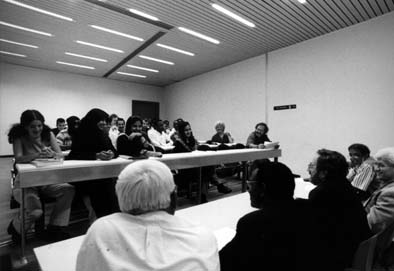
This September, ICTP awarded graduate certificates to 25 students who successfully completed the Centre's 1998-1999 Diploma Course. The certificates, granted in the fields of high energy physics, condensed matter physics and mathematics, were given to students from 19 developing countries. Twelve of ICTP's 1998-1999 Diploma Course graduates will be moving on to doctorate programmes at institutes in North America and Europe, including Cornell University, Auburn University, and the University of California at Davis in the United States; the University of Toronto and the University of Western Ontario in Canada; the University of Berlin in Germany; and Paul Scherrer Institute in Switzerland. At the same time, ICTP welcomed 27 students from 19 developing countries, including Cuba, Iran, Liberia and Senegal, to its 1999-2000 Diploma Course. The programme, launched in 1991, provides students who have earned master's degrees in physics or mathematics in their home countries with a one-year post-graduate training course.
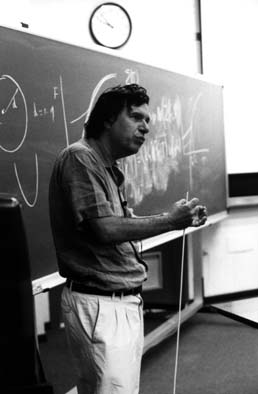
Giorgio Parisi, professor of physics at the University of Rome La Sapienza, is the recipient of the ICTP 1999 Dirac Medal. He will receive the award at a ceremony to be held at the Centre early next year. Parisi's outstanding contributions to physics have spanned a broad range of topics, including elementary particle physics, phase transitions, mathematical physics, string theory, theoretical immunology, neural networks, disordered systems, and non-equilibrium statistical physics. He has worked at Columbia University, New York, USA, and the Institute des Hautes Etudes Scientifiques and Ecole Normale Supérieure, in Paris, France. He has also led the APE (Array Processor Experiment) project for the construction of an advanced fast computer under the sponsorship of the Italian National Institute of Nuclear Physics (INFN). Parisi has written two books: Statistical Field Theory and Spin Glass Theory and Beyond (with Marc Mezard and Miguel Virasoro).
Abderrahmane Kadri, an ICTP Regular Associate from 1989 to 1996 and professor at the Physics Institute of the University of Oran, Algeria, has been appointed Chairman of the Atomic Energy Commission of Algeria. In a recent letter to the ICTP Director, Kadri expressed "heartfelt gratitude for the wonderful mission that ICTP has been accomplishing for many years, by providing continuous and invaluable support to many generations of scientists from throughout the world."